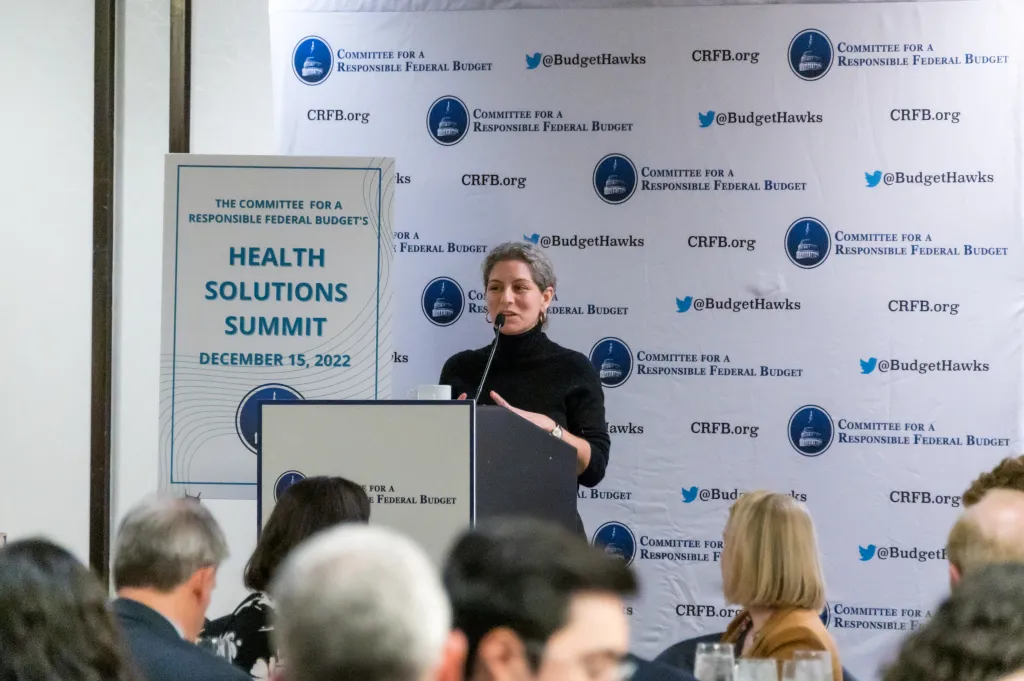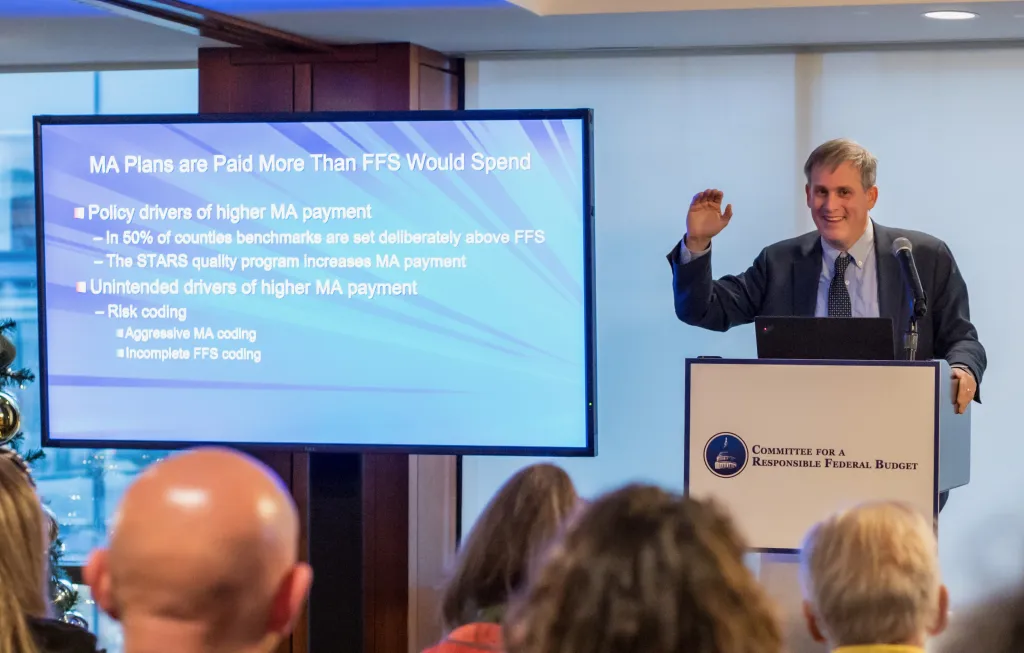Event Recap: Health Solutions Summit
On December 15, the Committee for a Responsible Federal Budget hosted our Health Solutions Summit: Options for the Next Congress. With the cost of health care rising and the Medicare trust fund quickly approaching insolvency, experts came together to discuss policy solutions for the next Congress to consider.
The event began with a keynote speech by Melanie Egorin, the Assistant Secretary for Legislation at the Department of Health and Human Services (HHS). Egorin explained that heading into 2023, HHS is thinking about how to expand health care while lowering costs both system-wide and for individuals, how to tackle disparities and inequities, and building a more resilient pandemic response. In response to audience questions about tackling health care costs and insolvency of the Medicare trust fund, she responded by noting the prescription drug savings in the Inflation Reduction Act and the potential for telehealth to generate savings as studies are being conducted on how telehealth will affect the utilization of services. She also noted that HHS looks forward to working with Congress to take action on Medicare trust fund solvency.

Melanie Egorin, Assistant Secretary for Legislation at the Department of Health and Human Services, delivers opening remarks at the Health Solutions Summit.
Carrie Colla and Chapin White from the Congressional Budget Office (CBO) discussed the health care options published in CBO's latest report, Options for Reducing the Deficit: 2023 to 2032. They talked about their analysis of policies capping federal Medicaid spending growth at inflation, removing the Medicaid funding match floor, increasing Medicare Part B premiums, reducing Medicare Advantage benchmarks, limiting the tax exclusion for contributions to health insurance premiums and health savings accounts, and ending the use of Medicaid provider taxes that inflate costs.
During a discussion with Marc Goldwein of the Committee for a Responsible Federal Budget, they noted the absence of any prescription drug policies in the publication due to uncertainty over how the passage of the Inflation Reduction Act's prescription drug provisions will impact CBO's baseline. Goldwein also asked how CBO incorporates changes in overall national health expenditures (NHEs) into their work, and the speakers noted that while CBO's mandate is to focus on federal health spending, many policies that reduce federal spending can also impact NHEs.
The event also featured a panel discussion on options for reducing commercial health prices moderated by Mark Miller of Arnold Ventures, with Cristina Boccuti of the West Health Policy Center, Dan Mendelson of Morgan Health, and Avik Roy of the Foundation for Research on Equal Opportunity. The panel discussed how high prices for services paid for by commercial insurance are directly tied to high and growing health care costs for household, employers, and taxpayers. There was consensus that industry consolidation is a big factor driving up prices. Panelists discussed different solutions including enhanced antitrust enforcement, increased transparency, capping prices, more competition, and equalizing payments regardless of site-of-service. The panelists agreed that some type of federal intervention was called for, and most felt that because competition is uneven by region, only federal government caps on prices have the potential to achieve large savings.

Panel on Commercial Prices. From L-R: Mark Miller, Cristina Boccuti, Dan Mendelson, and Avik Roy.
Following the first panel, Michael Chernew, professor of health care policy at Harvard Medical School and the current chair of the Medicare Payment and Advisory Commission (MedPAC), discussed the Medicare Advantage (MA) program with Committee for a Responsible Federal Budget Director of Health Policy Josh Gordon. Chernew explained that the MA program, which allows those on Medicare to purchase private insurance plans, provides services at a lower cost than traditional fee-for-service (FFS) Medicare. However, due to the design of the plan payment system and issues like coding intensity, the overall program costs the federal government more to provide benefits than through FFS Medicare.
The discussion covered how MA plans use the higher funding to provide supplemental benefits to seniors but that those benefits are small compared to payment amounts. This suggests that incremental payment reductions would be unlikely to eliminate the provision of those benefits. Other concerns that arose in the discussion were the prospect that as MA enrollment continues to grow and how experiments in the FFS system attempting to move to more efficient health care spending, like Alternative Payment Models, become less powerful with that continued enrollment.

Michael Chernew speaks about the Medicare Advantage program.
The final panel was moderated by Rachel Roubein of the Washington Post and featured Robert Berenson of the Urban Institute, Debra Curtis of McDermottPlus, Julia Harris of Bipartisan Policy Center, and Josh Trent of Leavitt Partners discussing Medicare policy issues likely to arise in the 118th Congress. Telehealth was mentioned as a top issue for both Democrats and Republicans and whether coverage extensions should be short-term or permanent. With the public health emergency approaching its end, the unwinding of Medicaid's continuous coverage requirements will also be a top fiscal and oversight issue. The physician fee schedule was also discussed and how Congress typically looks to address payments at the last minute in end-of-year packages. Lastly, Medicare trust fund solvency was discussed as an issue with bipartisan interest.
The Committee for a Responsible Federal Budget thanks all those who participated and attended the event.

